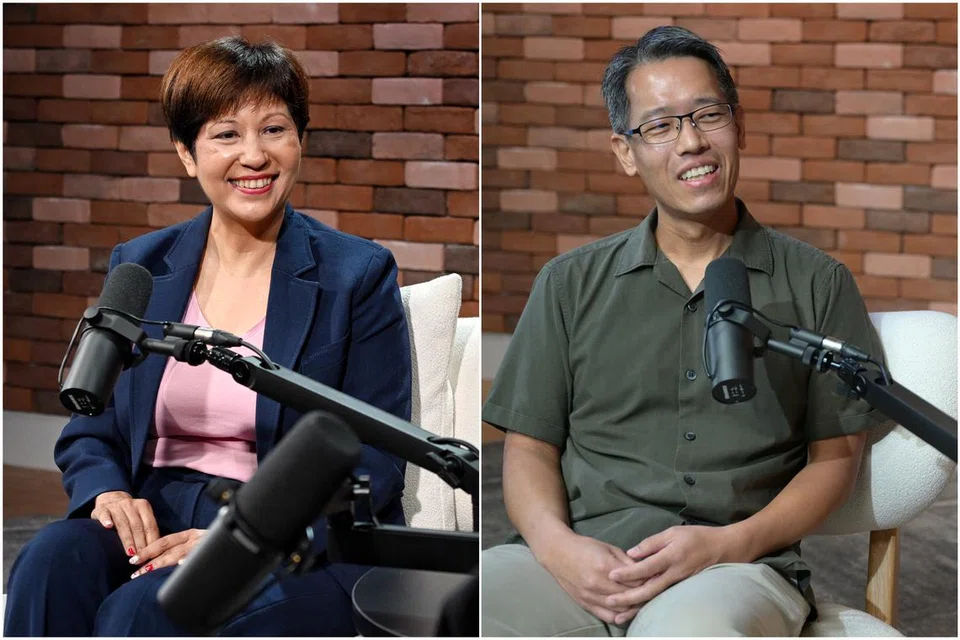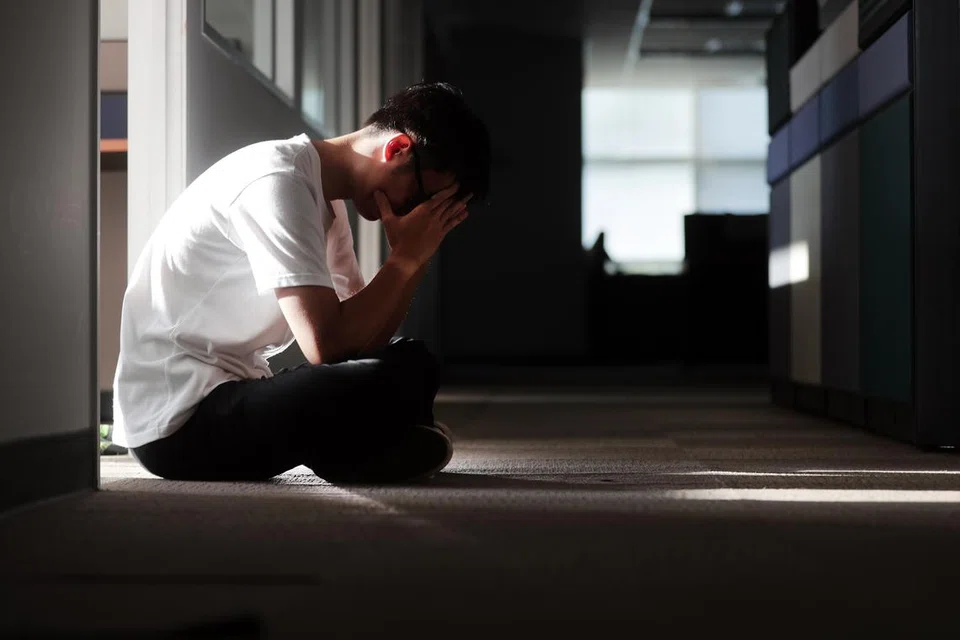GE2025: Are video podcasts a new political space to connect with hearts and minds?

The Usual Place, a podcast by The Straits Times, has hosted politicians including Minister in the Prime Minister's Office Indranee Rajah and Workers' Party MP Gerald Giam.ST PHOTOS: KUA CHEE SIONG, NG SOR LUAN
SINGAPORE – "Voucher Wong" and the God of Fortune – these are the nicknames that netizens have taken to calling Prime Minister Lawrence Wong after he announced a slew of goodies in Parliament during his Budget speech.
But what does PM Wong think of these cheeky monikers?
Sitting on an orange couch with mics in front of him, PM Wong laughed it off. "I suppose people will make memes and jokes about the Budget... I'm certainly not the God of Fortune, nor am I 'Voucher Wong'," he said, joking with the hosts of The Hop Pod podcast.
The light-hearted banter continued on issues ranging from the cost of living to housing policy. A YouTube video of the podcast episode has amassed over 45,000 views since it was posted on March 9.
This was at least PM Wong's third time on a video podcast since December, after also appearing on the podcasts The Daily Ketchup and Plan B.
These shows put politicians like PM Wong in an informal setting – sometimes seated with their hosts on a couch, and at other times across a coffee table. The banter is casual, and oftentimes hosts adopt a light-hearted take on issues.
Politicians like PM Wong have been increasingly turning to this casual format as a way to connect with voters beyond the reach of traditional media, said experts.
Health Minister Ong Ye Kung, Minister of State for Trade and Industry Alvin Tan and Progress Singapore Party Non-Constituency MP Hazel Poa are just some of the politicians who have appeared on podcasts such as Front Row, Yah Lah But, and Teh Tarik with Walid.
The use of video podcasts by politicians as part of their communications and campaigning strategy is not unique to Singapore – the medium has played an outsized role in shaping political discourse in the US, with popular shows like The Joe Rogan Experience reaching millions of viewers and listeners.
With the next general election on the way, observers say video podcasts here – which can garner as many as hundreds of thousands of views – are shaping up to be a crucial space for politicians keen on capturing the hearts and minds of voters.
The format started gaining popularity during the 2020 General Election, which was held during the pandemic and had no physical rallies. This led politicians to turn to virtual discussions, live shows and podcasts, said Dr Carol Soon, an associate professor in media regulation and digital policy at the National University of Singapore.
Since then, newer podcasts have emerged and Singaporeans have turned to them to make sense of local politics and to get to know political candidates better, said Dr Soon.
Political observers said the video podcast format lends itself to more candid and tongue-in-cheek conversations and feels more unfiltered, which can help make politicians seem more relatable to voters.
For instance, PM Wong in January spoke on The Daily Ketchup podcast about being an introvert in the public eye and what his first day as prime minister was like after he took over in May.
Dr Tracy Loh, a senior lecturer of communication management at Singapore Management University, said: "Podcasts are more off-the-cuff, which allows the politicians' personality to really shine through and could make them seem more relatable if they know how to use the format well."
Political scientist Walid Jumblatt Abdullah, who runs the eponymous podcast Teh Tarik with Walid, said he has hosted around 25 politicians on his podcast show, which includes a mix of current and former politicians from the PAP and the opposition.
The associate professor at Nanyang Technological University said he started his podcast in the wake of the 2020 General Election to address "a thirst for political knowledge" among younger people and older millennials.
The Usual Place, a podcast by The Straits Times, has hosted politicians including Education Minister Chan Chun Sing, Minister in the Prime Minister's Office Indranee Rajah and Workers' Party MP Gerald Giam, since its launch in April 2024.
But Hong Kong Baptist University professor of politics, film and cultural studies Kenneth Paul Tan warned that the spontaneous nature of the format opens politicians to the risks of committing faux pas or appearing overly rehearsed and inauthentic.
Politicians with strong communication skills and who can appear comfortable in spontaneous environments stand to gain the most from appearing on podcasts, said Prof Tan, who in January published a research paper on how politicians in Singapore have used podcasts as a communication tool.
His research revealed that many netizens expressed having a more positive impression of a politician after hearing them share their stories and explain their views.
Pointing to Minister in the Prime Minister's Office Indranee Rajah, Prof Tan said she brought "clarity and warmth" to her explanations of government policy across various podcast appearances.
Observers also said podcasts may level the playing field for opposition politicians with fewer resources, who can gain exposure and reach a diverse range of audiences by appearing on such shows.
But they cautioned against conflating listenership or viewership with vote share.
Citing the 2023 Presidential Election, Dr Natalie Pang, head of NUS' communications and new media department, said: "President Tharman (Shanmugaratnam) did not have as much traction on social media as the other candidates, who used social media quite well."
Nonetheless, President Tharman went on to win the presidency with a strong vote share of 70.4 per cent.
Dr Pang said this showed that even though social media content can change people's minds about politicians, voting behaviour is shaped by other factors, including political affiliations and the candidates' credentials.
Votes aside, video podcasts may offer an avenue for people with different political views to engage with one another – important at a time of growing political polarisation across the world, say observers.
Dr Pang added that some podcast hosts in Singapore have shown a readiness to disagree with the politicians that appear on their shows, and often voice out what people are thinking or have questions about.
"Quite often, these are points of contention and disagreement. And you then see the politician having a candid exchange about those questions… They (the politicians) actually use the podcast as a platform to engage those points of disagreement."
Join ST's WhatsApp Channel and get the latest news and must-reads.


